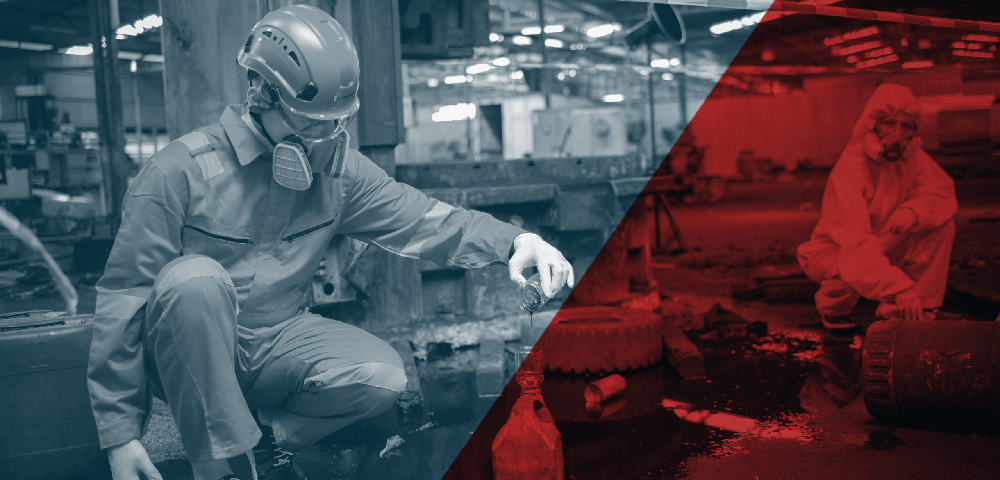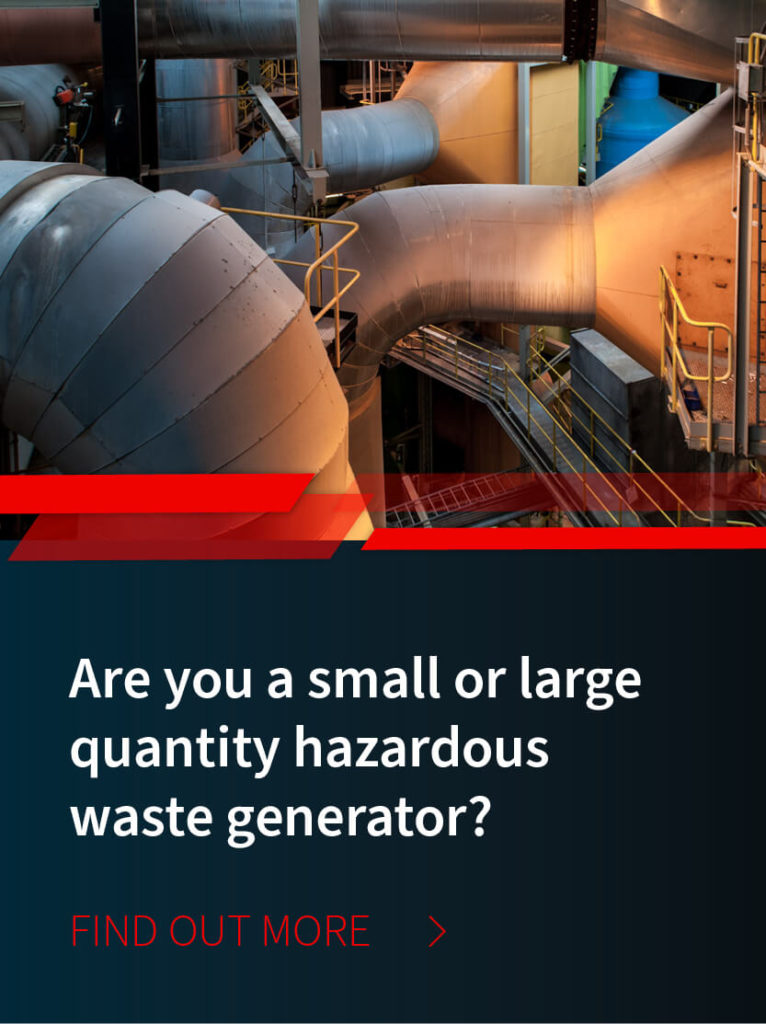
/ IN THIS BLOG
Hazardous waste removal companies might not be tops on your list of vendors you’re excited to work with. We get it. Allocating a budget for hazardous waste disposal probably isn’t the most glamorous part of managing your facilities. Many managers in a wide range of industries, from manufacturing to education to healthcare need to address their hazardous waste liabilities. But when you’re comparing quotes and one hazardous waste provider comes in significantly lower than the rest, it’s tempting to view waste removal as a line item to trim.
Although it’s essential to be cost-conscious in your business, simply choosing the lowest bidder when it comes to hazardous waste management can lead to expensive consequences. That “budget-friendly” vendor might lack proper licensing, carry inadequate insurance, or dispose of your waste in ways that violate local, state, or federal regulations.
Under the Resource Conservation and Recovery Act (RCRA), you, the waste generator, not the business you’ve contracted with, retains cradle-to-grave responsibility for hazardous waste. That means if your waste is mismanaged at any point after it leaves your facility, your company could still be held legally and financially responsible. This illustrates just how high the stakes are when it comes to choosing the right removal company.
Taking the time to learn how to evaluate quotes and compare providers can go a long way to finding the safest, most compliant service to minimize and eliminate potential risks to your organization.
01 / What’s at Stake: Your Facility’s Liability When it Comes to Waste
Hazardous waste compliance is not something you can outsource entirely. That’s because, under federal law, the company that generates the waste is ultimately responsible for it. Yes, that means, even if your facility follows every rule and guideline while this waste is at your facility, if something goes wrong once it leaves your property, you’re still responsible. This is known as cradle to grave liability and it’s a central principle of the federal RCRA.
What this means is if you use a hazardous waste provider who happens to cut corners or improperly disposes of your waste, regulators will not only be looking to hold this hauler accountable. They can also come after your facility.
Proper waste disposal has a number of unavoidable costs, so when a company promises to provide such services at surprisingly low prices, there may be a reason for this. If a container is dumped illegally, ends up at an unpermitted site, or is handled by an unlicensed subcontractor, your business could face a host of unpleasant and costly consequences, such as:
Fines
Lawsuits
Environmental cleanup
Long-term reputational damage
Once your name is on the manifest, it is your responsibility to know exactly where your waste is going, how it will be handled, and whether every step meets regulatory standards. That’s why it’s so important to choose a reliable company that carries a long-track record of compliance and responsibility. Once waste leaves your facility, your company’s well-being is in the hands of your service provider. That trust should be earned. Choosing the wrong vendor puts your company at risk. Not just legally, but operationally and financially. That risk rarely shows up in a low quote, but the consequences do.
02 / What “Low Priced” Can Really Mean When it Comes to Hazardous Waste Liability
When a hazardous waste removal quote comes in far below the rest, it should raise a red flag. In some cases, such low pricing may be possible because the company uses shortcuts. Common examples of this include:
Lacking proper permits
Underinsured operations
Using unqualified subcontractors for transport and disposal
In some cases, the company may not even handle the waste themselves but broker it out without full transparency. These shortcuts put your compliance, and your business, at risk.
Before signing a contract, ask questions. This list provides a good starting place:
Who owns the trucks?
Where will the waste go?
Can the company show active permits for transport and disposal?
Do they follow proper manifest tracking procedures?
Can they provide proof of insurance and references from similar facilities?
Price alone tells you nothing about the integrity, reliability, or regulatory standing of the company. If a quote is significantly lower than others, it’s easy to want to assume the best case scenario. But there’s a good chance the reason for this is because critical services are being excluded or because the company is willing to take risks that your business cannot afford to share.
03 / Waste Disposal Isn’t One-Size-Fits-All
Hazardous waste disposal pricing varies for good reason. What you pay depends on a number of factors, such as:
The type of waste
How much you generate
How often you need pickups
Your facility’s location
How far that waste needs to travel for treatment or disposal
For example, transporting a single drum from a rural facility can cost significantly more than picking up a pallet in a city close to a treatment facility. If your waste requires special handling, stabilization, or incineration, that adds to the cost. If a vendor owns its own trucks or operates its own permitted disposal facilities, they may have more flexibility on pricing than a broker with fewer internal resources.
This is why it’s important to compare quotes carefully. One company might quote based on full-service handling with proper manifesting, while another leaves out key steps or relies on non-compliant practices. A low quote could mean fewer services, unpermitted disposal sites, or unreliable pickup schedules.
Make sure you understand what’s included, what’s not, and how each quote aligns with the specific needs and risks of your waste stream. Hazardous waste removal is not a flat-rate service. If a price feels too low, find out what has been left out before committing to a service.
04 / Consequences of a Bad Choice in Hazardous Waste Removal Companies
You might be wondering if perhaps cost savings could outweigh the risks. So it’s important to understand what outcomes can occur if you choose a hazardous waste removal company based solely on price.
If your waste ends up in the wrong hands or at an unpermitted site, your business may face legal action, environmental investigations, or expensive cleanup requirements. What’s more disturbing is the fact that these issues can unfold months or even years after the waste has left your facility.
Regulatory violations are just one part of the risk. There is also the potential for harm to the environment, health and safety violations, and lawsuits tied to any damage caused. Beyond that, your company image could be permanently damaged and face serious community backlash. And as we all know, once public trust is lost, it’s a long and costly process to regain.
If your company is tied to an incident involving improper disposal, it could result in:
State or federal fines
Civil or criminal liability
Required site remediation
Business interruption or shutdown
Loss of contracts or permits
These are not rare or hypothetical risks. Environmental enforcement actions are increasing across the country, and thanks to better monitoring methods, regulators are placing more scrutiny on waste generator responsibility. A low price might look good in the short term, but the long-term costs of a bad decision can far outweigh any initial savings.
05 / How to Vet a Hazardous Waste Removal Company
Selecting the right hazardous waste removal partner requires more than identifying the lowest bidder. It involves confirming that the company has the expertise, infrastructure, and compliance record to manage your waste safely and legally. Here are a few essential steps:
Get multiple quotes: Reach out to at least three reputable providers. This helps establish a fair market range and gives you a better sense of what is included in each proposal.
Ask about permits and insurance: “Trust, but verify,” is a good quote to follow. Verification should include making sure that the company holds all necessary permits for hazardous waste transportation and disposal. Confirm they carry sufficient insurance to cover potential incidents or liability.
Request references: It can be helpful to speak to other industrial or manufacturing clients. Ask about reliability, responsiveness, and whether the company has ever been involved in a compliance issue. A trust-worthy provider will be happy to supply such referrals.
Understand their handling process: Find out where the waste is going and how the company controls the entire chain of custody.
Make sure they know your waste stream: It’s common for a waste handling company to specialize in a number of specific industries or waste types. However, it’s important to make sure your provider has experience in handling the particular materials your facility generates.
Review their documentation practices: Ensure they follow proper manifesting, recordkeeping, and reporting. Weak documentation can lead to compliance gaps even if disposal is technically correct.
Doing your due diligence up front helps protect your company from unnecessary risk, unexpected costs, and regulatory trouble down the line.
06 / MCF’s Reliable Approach to Waste Management Compliance
At MCF Environmental Services, we understand the pressure facility managers face when balancing compliance with cost. That’s why our team works with each client individually to find the perfect combination of value and peace of mind. We have years of experience working with industrial and manufacturing clients across the country and are proud of our track record of providing reliable, transparent hazardous waste removal services that never cut corners.
MCF Environmental is fully licensed and insured to transport, treat, and dispose of a wide range of regulated waste types. We manage everything, from pickup to documentation to disposal, so you always know where your waste is going and how it will be handled. Our approach ensures cradle to grave compliance and minimizes liability at every step. Not only do we provide reliable disposal solutions, but many businesses rely on our guidance to provide them with the direction and leadership to enact best practices across their facilities.
If you are reviewing hazardous waste removal companies or want a second opinion on a quote, contact MCF. We are here to help you make a confident, compliant choice that protects your business and your team.
07 / Frequently Asked Questions
Is it illegal to use a cheap hazardous waste company if they are not fully permitted?
If a company lacks the required permits and mishandles your waste, your business may still be held responsible under cradle-to-grave liability rules.
What permits should a hazardous waste hauler have?
At minimum, a waste disposal provider should have valid state and federal transport permits, EPA ID numbers, and insurance that covers hazardous materials handling.
Can I be fined even if the disposal issue happens after pickup?
Yes. Under RCRA, the generator is responsible for the waste from creation through final disposal. Improper handling by your vendor can result in penalties for your facility.
Robert Losurdo
President, COO








